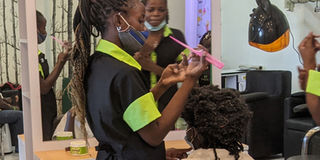Prime
We need more women in the formal financial system – Ojangole

A woman attends to a customer in a salon. Women face more challenges than men in starting, managing, and growing their enterprises. PHOTOs/RACHEAL MABALA
What you need to know:
Women’s access to financial services is also limited by the fact that, in general, they do not possess adequate productive assets or property which can be accepted by formal financial institutions as conventional forms of collateral.
Women empowerment is key to attaining the agenda 2030 Sustainable Development Goals (SDGs). Specifically, Goal 10 on reducing inequalities; Goal 8 on promoting full and productive employment and decent work for all, and Goal 5 on achieving gender equality, cannot be realised without women’s economic empowerment. Achieving these three goals would in turn contribute to other cross-cutting goals that are also in part dependent on women’s economic empowerment such as Goal 1 on ending poverty: Goal 2 on food security and Goal 3 on health.
Women play a key role in the economy’s development through business, agriculture, trade, industry, and domestic care work. Women today have greater access to /and control over productive resources, assets, and services, political and social representation, meaningful participation in decision-making spaces and processes, and access to decent work.
According to World Bank (2019), women account for 77 percent of the agricultural labour force. This sector contributes 21% to Gross Domestic Product (GDP) and accounts for 40 per cent of Uganda’s export earnings while four in every 10 business owners are women (UBOS, 2020).
Barriers
Women are just as inclined as men to engage in entrepreneurship and therefore impacted by the impediments to growth as business owners. Women face more challenges than men in starting, managing, and growing their enterprises. This is partly the burden of history, of catching up in acquiring the necessary capacities, skills, and resources due to negative cultural norms and attitudes about women’s roles.
Women have been (and continue to be) less mobile and the unequal demands of domestic responsibilities on women’s time among others have fettered the progress. Despite their role in the agriculture sector and within the small business sector in Uganda, women face a myriad of constraints surrounding access, ownership, and control over the means of production.
According to the UNDP report (2021), women control less than 20 percent of their output. It is estimated that 69 percent of all women in Uganda don’t own land and are only granted access through their spouses or other male family members.
When women do not have effective ownership over land, this negatively influences decisions about long-term investments in the land as well as their ability to access financial services since they lack collateral. Relatedly, about 49 percent of women lack access to or decision-making ability over credit. Women own only 4 percent of rural land, according to the Islamic Development Bank report 2019.
Female farmers’ low access to productive resources and services, in comparison to male farmers, creates a gender gap of 13 percent in agricultural productivity in Uganda. According to the UN Women Report (2021), eliminating this gap would produce an increase of 2.8 percent in current crop output and 1.6 percent in agricultural GDP (about $156 million (Shs562 billion).
In addition, crop and livestock value chains should be seen as gendered; men dominate high-value cash crops and larger livestock assets such as cows while women have more authority over food security crops and smaller livestock such as poultry. Relatedly, economic opportunity is segmented by gender. Women are more likely to operate in the informal sector, in smaller enterprises, and lower value-added sectors.
Differences in legal capacity and property rights also limit women’s capacity to own and operate businesses, access finance, or own and control the use of productive resources, including land.
Having access to financial services allows women to procure the inputs, labour, and equipment they need for their agricultural and off-farm activities.
Women’s access to finance is constrained by socio-cultural, economic/legal, and in some cases educational barriers. Women’s access to financial services is also limited by the fact that, in general, they do not possess adequate productive assets or property which can be accepted by formal financial institutions as conventional forms of collateral.
As the world celebrates Women’s Day today under the theme, “Breaking the Bias”, we need a world where women everywhere take their rightful place as partners in building the world we want.
Barriers
Challenges
Despite their role in the agriculture sector and within the small business sector in Uganda, women face a myriad of constraints surrounding access, ownership, and control over the means of production.
According to the UNDP report (2021), women control less than 20 percent of their output. It is estimated that 69 percent of all women in Uganda don’t own land and are only granted access through their spouses or other male family members.
The author is the managing director of Uganda Development Bank.




